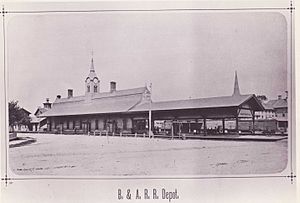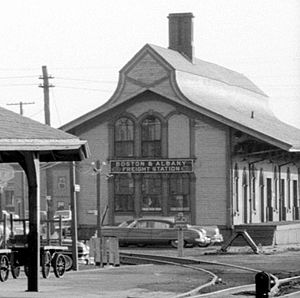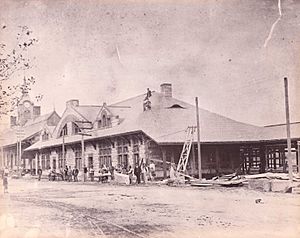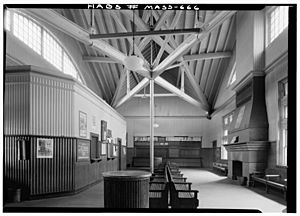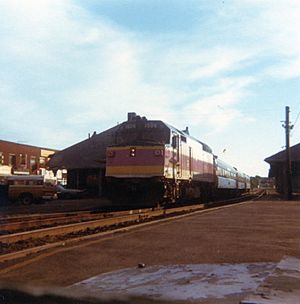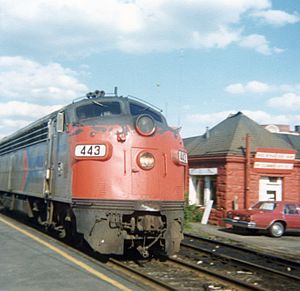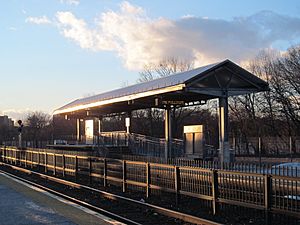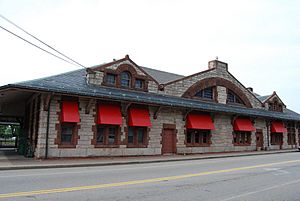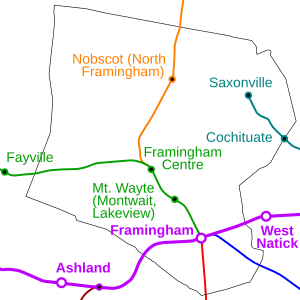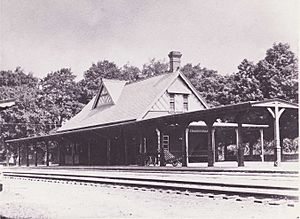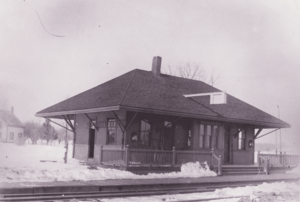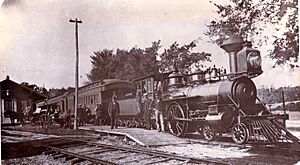Framingham station facts for kids
Quick facts for kids
Framingham
|
|||||||||||||||||||||
|---|---|---|---|---|---|---|---|---|---|---|---|---|---|---|---|---|---|---|---|---|---|
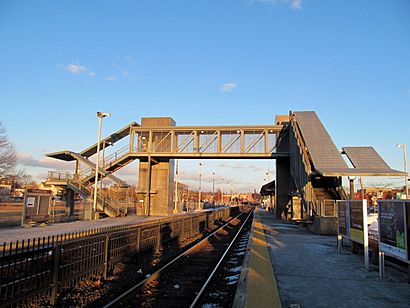
Modern station platforms and pedestrian bridge, opened in 2001
|
|||||||||||||||||||||
| Location | 417 Waverly Street Framingham, Massachusetts |
||||||||||||||||||||
| Owned by | MBTA | ||||||||||||||||||||
| Line(s) | Worcester Main Line | ||||||||||||||||||||
| Platforms | 2 side platforms | ||||||||||||||||||||
| Tracks | 2 | ||||||||||||||||||||
| Connections | |||||||||||||||||||||
| Construction | |||||||||||||||||||||
| Parking | 166 spaces ($4.00 daily) 4 accessible spaces |
||||||||||||||||||||
| Bicycle facilities | 10 spaces | ||||||||||||||||||||
| Disabled access | Yes | ||||||||||||||||||||
| Other information | |||||||||||||||||||||
| Station code | FRA (Amtrak) | ||||||||||||||||||||
| Fare zone | 5 (MBTA) | ||||||||||||||||||||
| History | |||||||||||||||||||||
| Opened | 1834 | ||||||||||||||||||||
| Rebuilt | 1848, 1885 (H. H. Richardson depot) 2001 (modern platforms) |
||||||||||||||||||||
| Previous names | South Framingham (until January 8, 1915) | ||||||||||||||||||||
| Traffic | |||||||||||||||||||||
| Passengers (2019) | 1,792 |
||||||||||||||||||||
| Passengers (2018) | 1,130 (weekday average boardings) (MBTA weekday average) | ||||||||||||||||||||
| Services | |||||||||||||||||||||
|
|||||||||||||||||||||
|
|||||||||||||||||||||
|
Framingham Railroad Station
|
|||||||||||||||||||||
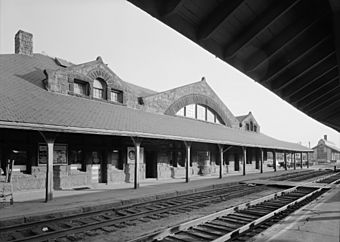
Framingham Railroad Station in 1959
|
|||||||||||||||||||||
| Built | 1885 | ||||||||||||||||||||
| Architect | H. H. Richardson | ||||||||||||||||||||
| Architectural style | Richardsonian Romanesque | ||||||||||||||||||||
| NRHP reference No. | 75000258 | ||||||||||||||||||||
| Added to NRHP | January 17, 1975 | ||||||||||||||||||||
Framingham is a train station in downtown Framingham, Massachusetts. It's a historic spot, with an old station building designed by a famous architect named H. H. Richardson. This building was one of the last train stations he designed in the northeastern United States.
Built in 1884–85, the station was a big stop for the Boston and Albany Railroad. It was also a central point for other train lines going to places like Milford and Fitchburg. Over time, the old station building became run down. In 1975, it was added to the National Register of Historic Places, which helped save it. It was then restored about ten years later.
In 2001, a new set of platforms was built nearby for the Framingham/Worcester Line and Amtrak trains. These new platforms are easier for everyone to use, including people with disabilities. Today, the Framingham station is one of the busiest on the MBTA system. The original H. H. Richardson station building is still there and is now used as a restaurant.
Contents
History of Framingham Station
Early Days of the Station
The first train tracks reached what was then called South Framingham in August 1834. This was part of the Boston and Worcester Railroad. The first main station building was a two-story wooden structure built in 1848.
After a new station was built, this old building was moved a bit west. It was then used as a freight house, which is a building for storing goods moved by train. It stayed that way until the 1960s when it was taken down.
Over the next few decades, South Framingham became a very important train center. Many different train lines connected here. For example, a line to Milford was built in 1848. Another line, the Agricultural Branch, connected to Framingham Center. These lines helped make South Framingham a busy place for trains and travel.
The Famous H. H. Richardson Station
In the 1880s, the Boston & Albany Railroad decided to build many new stations. They hired a famous architect, H. H. Richardson, to design nine of them. The South Framingham station, built in 1884–85, was the biggest and most expensive of these nine.
This station is a great example of the "Richardsonian Romanesque" style. It was built with rough granite stones and had a strong roofline with arches. Many people loved Richardson's designs, and this station was praised for its beauty. A small building for baggage was also built nearby in the same style.
The station remained very important for many years. In 1915, because South Framingham had grown so much, the station was officially renamed Framingham. However, after World War I, fewer people used the trains. Many of the smaller branch lines eventually stopped passenger service.
The MBTA Era and Restoration
By the 1960s, train service started to decrease. In 1973, the MBTA began to help pay for train service to Framingham. In 1975, the modern Amtrak Lake Shore Limited train started stopping at Framingham. This train still provides long-distance service today.
By the 1970s, the old station building was in bad shape. Part of its roof even fell in 1978. But on January 17, 1975, the building was added to the National Register of Historic Places. This helped save it. The building was restored in 1985 and has been used as a restaurant ever since. While the inside has changed, the outside still looks much like it did when it was built.
In the 1990s, train service to Worcester started again, after being stopped for many years. This meant more trains were passing through Framingham.
A New Station for Modern Times
In 1990, a law called the Americans with Disabilities Act of 1990 was passed. This law said that all new train stations must be accessible for people with disabilities. It was hard to make the old 1885 station building accessible because it was so close to the tracks.
So, new platforms were built just west of the old station. These new platforms opened in early 2001. They have special "mini-high platforms" that allow people to get on and off trains more easily. A footbridge with elevators was also built. This lets passengers cross the tracks safely without walking on them.
Today, Framingham is a very busy station. Many MBTA trains stop here on weekdays, and some also run on weekends. It's the second busiest station on the line outside of Boston. The daily Amtrak Lake Shore Limited train also stops here, connecting Framingham to places like Chicago and Albany.
In 2016, the MetroWest Regional Transit Authority (MWRTA) took over managing the station. This helps the MBTA save money and allows the MWRTA to improve the station, like adding more parking.
Other Framingham Train Stops
Besides the main station in South Framingham, there were other train stops in and around Framingham.
- The Agricultural Branch line had three stops:
* Montwait (also called Mt. Wayte or Lakeview) was near Farm Pond. It served a neighborhood and a worship camp. * Framingham Centre (sometimes just called Framingham) was near Maynard Street. It opened in 1849 and had a new station built in 1855. * Fayville was just over the border in Southborough but served parts of Framingham. All these stations closed in 1937, and their buildings are gone.
- The Framingham & Lowell Railroad also shared the South Framingham and Framingham Centre stations. It had another stop called Nobscot (or North Framingham). This station closed in the 1930s. The old Nobscot post office and library building, which also sold train tickets, has been restored.
- The Saxonville Branch line had two stations in Framingham:
* Cochituate was on the eastern border with Natick. * Saxonville was the end of the line, located off Concord Street. This line was not used very much and stopped passenger service in 1936. Neither of these station buildings are still standing.
Today, the only train stations in Framingham are the main Framingham station. However, nearby stations in Ashland and West Natick also serve some areas of Framingham.
Bus Connections
The Framingham station is a hub for many local buses. Eight of the 17 bus routes run by the MetroWest Regional Transit Authority (MWRTA) serve the station.
- Five routes (2, 3, 4, 7, Framingham Commuter Shuttle) stop at a curved parking lot on the north side of the tracks.
- The Westborough Commuter Shuttle stops on Concord Street.
- Routes 5 and 6 stop on Waverly Street, on the south side of the tracks.
The main bus center for the MWRTA, called the Blandin Hub, is about 0.6 miles east of the station. Many routes connect there. Another bus hub, the Waverly Hub, is about 1 mile east of the station.
Station Layout
The Framingham station has two platforms, one for each direction of travel. These platforms are "high level," which means they are at the same height as the train doors. This makes it easy to get on and off the trains.
A footbridge with elevators connects the two platforms. This allows people to safely cross over the tracks to reach their train. There is also a medium-sized parking lot next to the station with 170 parking spaces.
Images for kids
 | Sharif Bey |
 | Hale Woodruff |
 | Richmond Barthé |
 | Purvis Young |




